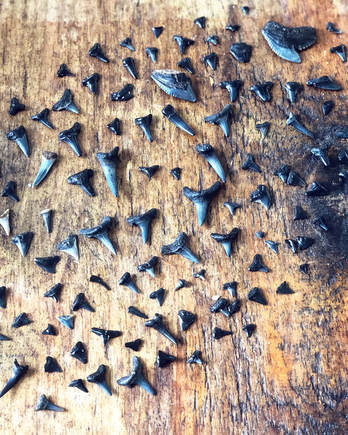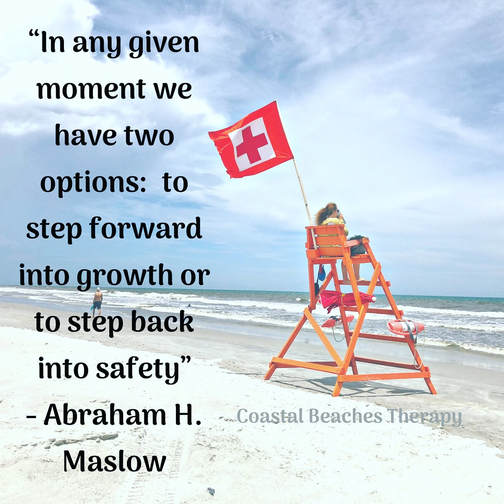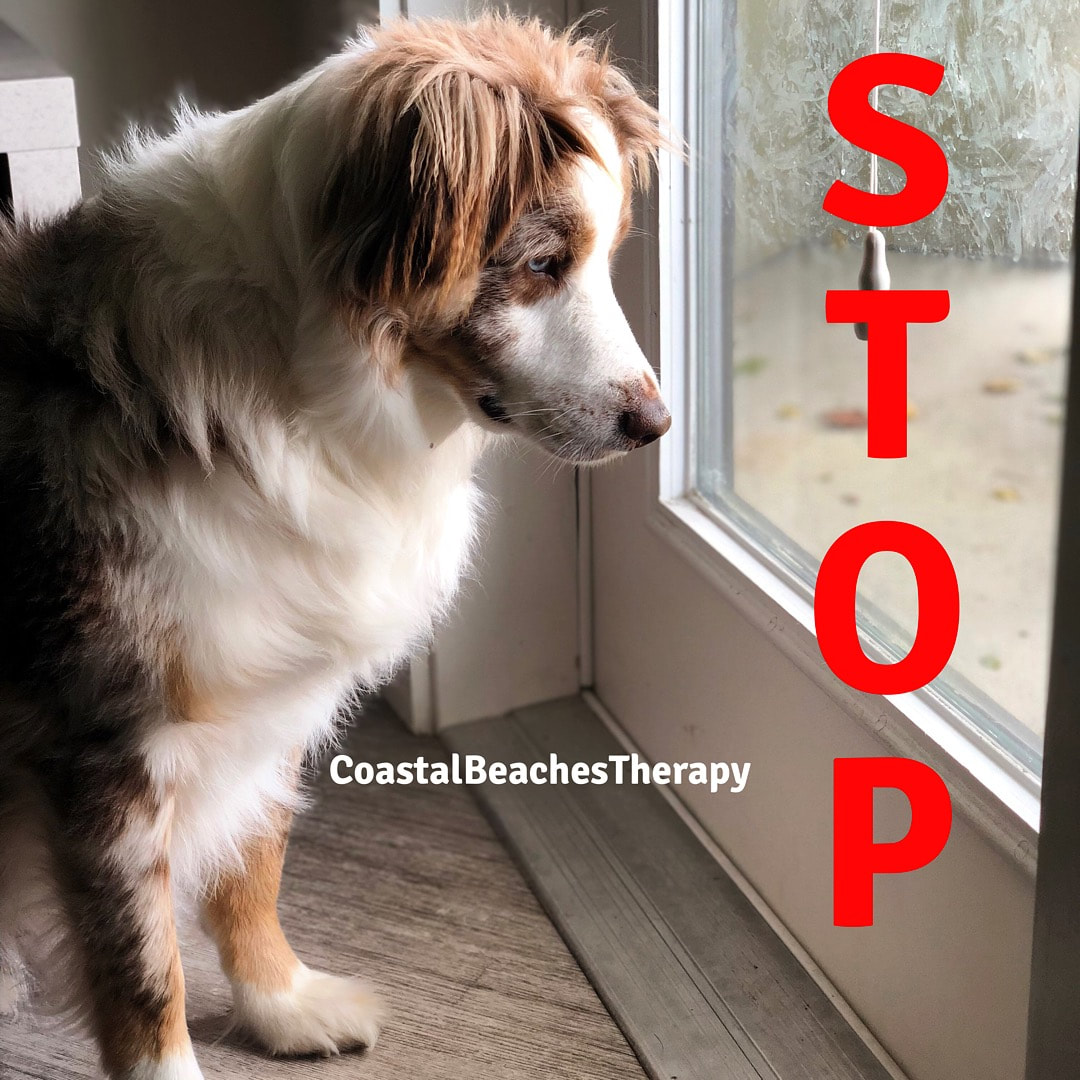|
When introducing mindfulness to clients who come to see me to help treat his or her anxiety, talking about a skill can realistically only go so far. I encourage my clients to get out there and experiment with different ways to turn off and tune out anxiety-inducing thoughts and to tune in to becoming mindful of the present moment.
What’s awesome about the neuroplasticity of the brain is that our brains are wired to learn and re-learn new tricks. For some, listening to a guided meditation may help. For others it may be through exercise, yoga, listening to or playing music, dancing, surfing, etc. I say one of the easiest ways to turn the volume of our thoughts down is by focusing the mind to a single task that has no connection or relationship to the issue at hand. One of my most favorite things about being here in Ponte Vedra Beach is being able to look for shark teeth! 🦈 No cell phone. No distractions. I simply take the time to put life on pause as I focus solely on looking down at the cluster of seashells on the sand. I would probably go as far to say that I scan the seashells as a shark tooth-fairy, searching for and collecting lost shark teeth.
What’s most important is that you find whatever it is that melts your butter and use it! If you feel comfortable, you are more than welcome to share some of your favorite ways you enjoy finding your zen ☮️ Comment below ⬇️ Bravo, Carolina Panthers! Mental health IS health. I deeply admire and respect the dedication of the athletes who recognize the importance of health and closely work with the dietitians to monitor nutrition, as well as the athletes who put in the work training hard with intense physical conditioning for peak performance on the field. Perhaps however, this will get the word out to the other National Football League teams that monitoring and fine-tuning mental health for the wellness of its' athletes is the REAL secret ingredient to the recipe of success!
Earlier today I had the opportunity to briefly speak with the Panther's Director of Wellness, Ms. Tish Guerin, LCSW. It was such a pleasure speaking with Ms. Guerin, learning about the work she is accomplishing as a pioneer of mental health, bridging the gap between mental health services and professional sports. You can read more about Ms. Guerin and the Carolina Panther's initiative for athlete wellness here. A big thank you to Yahoo Sports for originally publishing the article. Yesterday, an incredibly gifted colleague of mine and I were talking about Hurricane Michael and the prognosis for recovery from the storm. This clinician resides in and works in Tallahassee, Florida and just recently started her own private practice in the area that narrowly just escaped the mass devastation brought to other cities along the panhandle from Michael's wrath. She went on to talk about her fears and frustrations with starting her new practice and losing a week's worth of income due to appointment cancellations. As a hurricane survivor myself, I can empathize with my dear colleague as a result of my own experiences managing tremendous loss and devastation in 2012 when Hurricane Sandy made a direct hit on my hometown. When my colleague told me how she was feeling tremendous fear and having self-doubt for her ability to grow her practice successfully, this is how I responded:
"That is frustrating! But you will make up for what you have lost. Maybe this isn’t a good example but think of a tsunami. With a tsunami, the water recedes A LOT and then just as the water appears to disappear completely, in comes the flood. I use this example because it’s something that despite 21st century technology, we can’t control it. Like we cannot control the elements of our businesses or relationships. Yes a tsunami brings mass destruction but that’s because us humans have occupied the earth. In reality the tsunami replenishes and supplies an abundance of nutrients to the earth so that things can blossom. Do not get discouraged because you are seeing a plot of land struggling. You are in a season of tremendous opportunity and growth - view your practice through a lens of abundance. Let the setbacks prepare you for what is about to come". I am sharing this with you on the blog today because I think there is great value in shifting our perspectives from worrying about what if, to remaining hopeful for what is and will be. When I work with client's who are experiencing symptoms related to anxiety and feeling anxious, I often encourage them to shift the dialogue from "What if" to "What IS". Go ahead and try it for yourself! Notice any shifts or changes when you hear your own voice say those words. Stay with it and see what comes up. As George Harrison once said, "here comes the sun, and I say, it's all right". Spooky season is officially underway...but Mental Health isn't something to be afraid of. We can all benefit from supporting one another. You never know what someone is trying to manage in his or her life. So if you choose to do one thing today, make the decision to be kind to yourself and others.
Being safe keeps us limited, especially when what we are keeping ourselves safe from isn't necessarily a real threat to our physical safety; it's the emotional safety that sets off the alarm in our bodies. Give yourself permission to let go of your fears. Even when the discomfort and pain from growth is hard at times, know that your transformation and growth is bigger and more important than anything you have held yourself back from.
Ah, the S.T.O.P skill. S.T.O.P is one of many skills utilized in Dialectical Behavior Therapy. This skill in particular is part of what DBT categorizes as a Distress Tolerance skill. A primary function of Distress Tolerance skills is to get you to a place of problem-solving instead of problem creation. So let’s break down the skill:
S - STOP. Literally, just stop! Don’t move an inch. Just pump the breaks. T - Take a step back from the situation, take a few deep breaths, and don’t jump right in and react. For example, even the most skilled firefighters have to take a step back and survey the scene before they enter a burning building. How unsafe and unwise would it be if they just made a run for it because they could see the immediate danger? O - Observe. Observe and notice what is going on both internally and externally. What is the real situation? What are you thinking and feeling? What are other people saying or doing? P - Proceed Mindfully. Act with awareness. When deciding what to do, consider your thoughts and feelings, consider the situation in its entirety, think about your goals and ask yourself what action will make it better or worse? I'm Amy Pope-Latham, Licensed Clinical Social Worker and founder of Coastal Beaches Therapy. What I find most fascinating and what gives me the most hope, for myself and for my clients, is that you have the capacity to live out your life as wholesomely as you have ever desired.
As a psychotherapist I often see people who are trying to cope with an unavoidable life event that happened and staying the same was not an option. I am an EMDR intensively trained therapist and I love what I do. It is our reaction, or patterns to pain that keep us from getting what we most want in life. People have been geared towards avoiding pain. When something hurts we do something to try to manage it. If you have been to a pharmacy in your lifetime, it's hard to miss the countless rows and rows of medications designed to keep us out of pain. And it's not just using medication and other habits we use to stay away from pain: we work too much, talk too much, get angry, go on shopping sprees, think too much, blame others, blame ourselves, isolate, cut off, or put on a mask. We will do anything to keep us from being in the moment feeling the full extent of whatever is there. And it's always easier to see these patterns in others other than ourselves. All of these things that we do to keep us safe also keep us from experiencing joy and love. |
AuthorAmy Pope-Latham, LCSW is a board certified mental health professional in Ponte Vedra Beach, FL. Archives
December 2022
Categories
All
|




 RSS Feed
RSS Feed